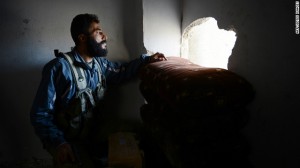 Nearly a week of fighting between Kurds and Arab rebels in northern Syria risks opening a new front in the already bloody battle for control of the country, underscoring the complexity of a conflict that threatens to ignite sectarian and ethnic tensions across the region.
Nearly a week of fighting between Kurds and Arab rebels in northern Syria risks opening a new front in the already bloody battle for control of the country, underscoring the complexity of a conflict that threatens to ignite sectarian and ethnic tensions across the region.
Efforts were underway Wednesday between the leadership of the rebel Free Syrian Army and Kurdish representatives in Turkey to negotiate an end to the clashes, in which scores of hostages have been seized and more than 40 fighters on both sides killed.
But the eruption of violence exposed little-noticed frictions that have been building between the mostly Arab Syrian opposition forces seeking to oust President Bashar al-Assad and Syrian Kurds, who increasingly see the revolt as an opportunity to extend their long-standing aspirations for the autonomy — and perhaps independence — of Kurdish areas across the region.
“This is setting the stage for a conflict that is going to come,” said Joost Hiltermann, deputy director of the Middle East and North Africa program at the International Crisis Group. And unless Syria’s already divided opposition takes steps to address Kurdish aspirations in a meaningful way, chances are high that a wider Arab-Kurdish war could follow any regime change in Damascus, he said.
The clashes have been small compared with the unchecked battles engulfing the country between the rebels and Assad loyalists. The opposition Local Coordination Committees said at least 104 people were killed Wednesday, many in airstrikes the government is increasingly relying on to try to crush the revolt. A bomb killed seven near the Sayeda Zeinab shrine, an important Shiite religious site on the edge of Damascus. Iraqi Shiites have warnedthat damage to the shrine could draw them deeper into the battle for Syria.
The Kurdish-Arab fighting only adds a new dimension to a conflict that risks embroiling Syria’s neighbors, including Turkey, which has expressed growing alarm at the assertiveness of Syria’s Kurds since Assad’s army withdrew from northeastern Syria in August, effectively giving Kurds control over the area.
The fighting first flared Friday after what appears to have been a misunderstanding between the Free Syrian Army units battling to drive government forces out of the northern city of Aleppo and the main Syrian Kurdish militia, which has steadily been asserting its control over Kurdish areas across the north.
Free Syrian Army rebels had entered the Kurdish neighborhood of Ashrafiyeh the previous day under what they said at the time was an agreement with the military wing of the Kurdish movement PYD, or Democratic Union Party, which is allied with Kurdish militants across the border in Turkey.
On Friday, Kurds staged demonstrations against the rebels, fearing that their presence would invite retaliation from the government in the form of airstrikes and artillery barrages. The two sides give conflicting accounts of exactly how the fighting flared, but avideo posted online by a Kurdish news channel makes clear that shots were fired at the demonstrators, prompting retaliation by the PYD that ended only after 30 rebels and 15 Kurdish fighters were killed and the rebels were ejected from the neighborhood.
Two days later, the hostilities spilled into the northern area of Aleppo province from which government forces were driven out by rebels months ago. An exchange of the hundreds of hostages seized by both sides in the Aleppo clashes soured after one of the Kurds was returned dead, bearing marks of torture inflicted by the rebels. Opposition fighters in the border town of Azaz fired shells at the nearby Kurdish village of Qastal Jendo. Early Wednesday, PYD fighters ambushed rebel fighters near the rebel-controlled Turkish border crossing of Bab al-Salameh, killing one and injuring two.
Compounding the complexity of the fight, however, are splits within both sides, which raise questions about whether the violence can be contained.
Col. Malik al-Kurdi, a spokesman for the Free Syrian Army in Turkey, called the attacks on Kurds a “mistake” and said the units involved, which he refused to name, do not fall under the control of the mainstream rebel leadership.
Kurds say that fighters from the extremist group Jabhat al-Nusra, suspected of adherence to the ideologies espoused by al-Qaeda, started the shooting in the city of Aleppo and that another rebel unit that does not fall under the Free Syrian Army’s command, the Northern Storm Brigade, launched the attacks on the Kurdish village from the rebel-controlled town of Azaz.
Abu Louay al-Haleb, a spokesman for the rebels in Azaz, accused the Kurdish militia of seeking to exploit rebel gains in the north to press their independence demands. “It is obvious what is happening,” he said. “The Free Syrian Army is about to finish the battle of Aleppo and the PKK is trying to occupy the area to create their future country,” he said, referring to the militant Kurdish rebel group that has been waging war against Turkey for decades.
The Syrian Kurdish movement, however, has cast the attacks as a plot fomented by Turkey to crush Kurdish aspirations “and eliminate the relative freedom enjoyed by the Kurdish people in Western Kurdistan,” a reference to the northeastern areas of Syria that have recently fallen under Kurdish control.
But Kurdish allegiances are also sharply divided between the PYD and the more moderate Kurdish National Council, which has sought an accommodation with the Syrian opposition. Tensions now are building among Kurds over approaches to the Syria conflict, said Kawa Youssef of the Kurdish Youth Movement, a moderate group sympathetic to the Syrian opposition.
“This is turning into a very big problem,” he said, warning of the risk that Kurds may also fight among themselves.
Washington Post

Leave a Reply
You must be logged in to post a comment.